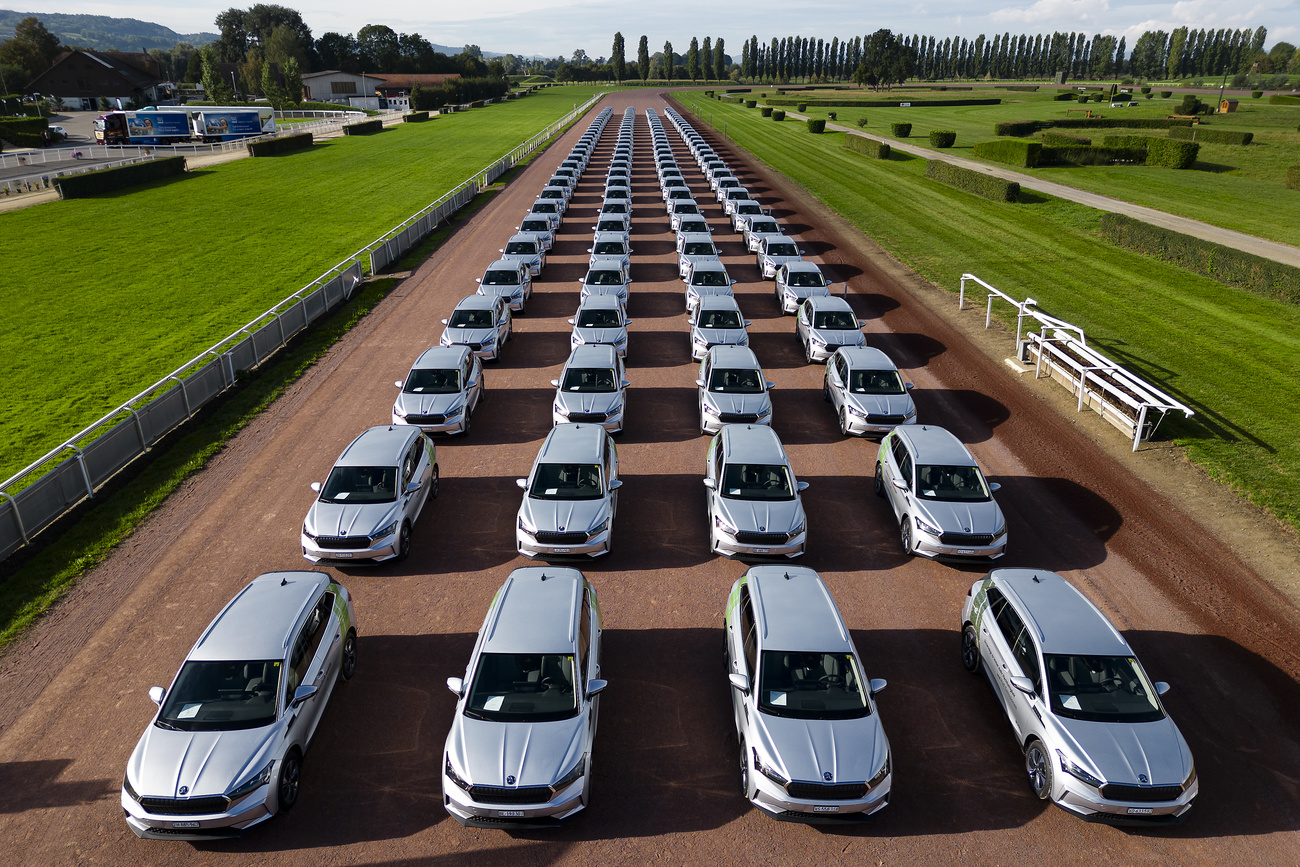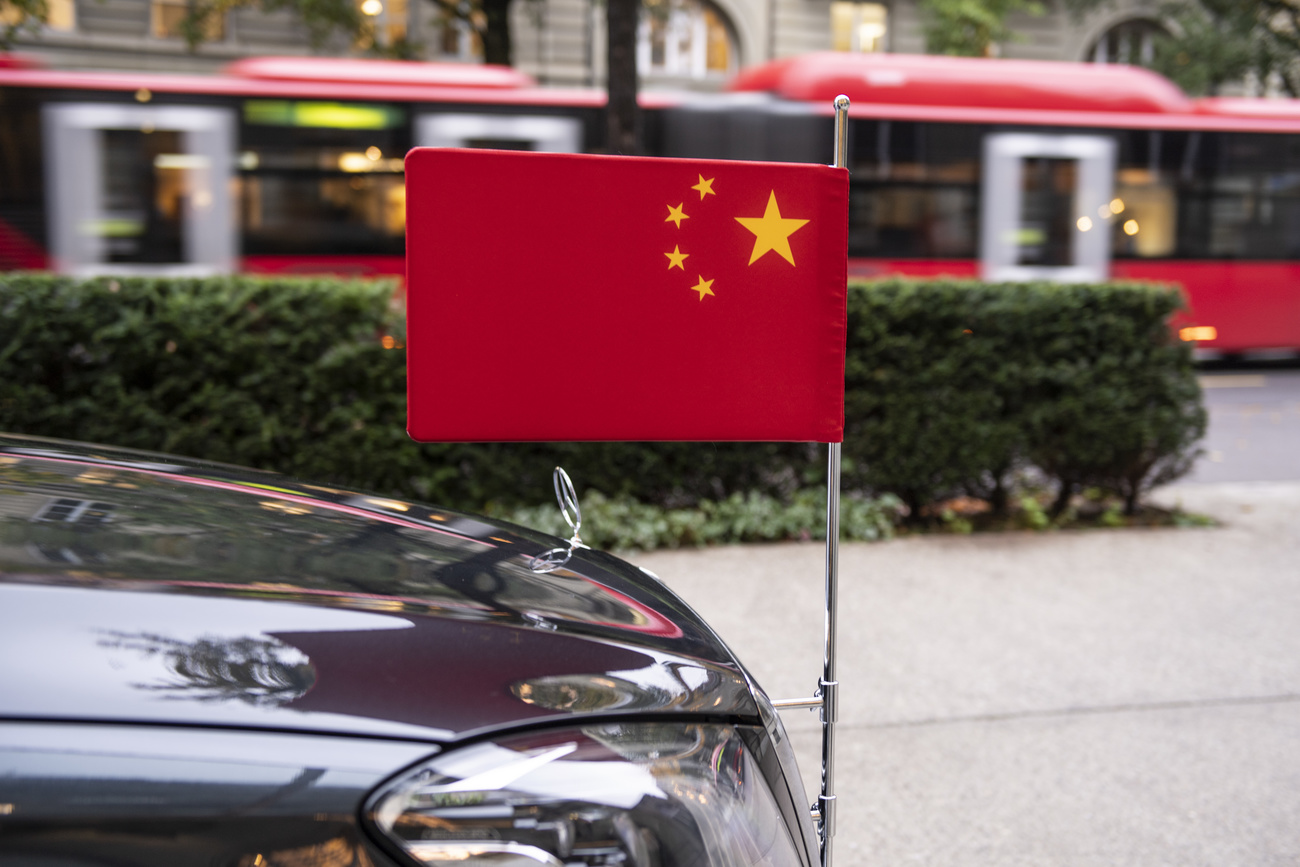Chinese electric vehicle maker eyes Swiss market – consumers beware
Electric cars are widely seen as key to the energy transition and China is a giant in that market. But the critical minerals that power electric vehicle batteries come at a price to Indigenous Peoples and their environment, warns Christoph Wiedmer of the Society for Threatened Peoples.
China’s leading electric vehicle maker hogged the spotlight during the 2024 edition of the Geneva International Motor Show. The absence of Western automobile industry players this year was striking, with only five brands bothering to attend the Swiss event.
The Chinese Build your Dreams (BYD) company grabbed the attention of visitors with its giant beautiful photos and films. The brand fit perfectly with the motor show’s slogan: Auto.Future.Now. But there are unnerving realities beneath that glossy perfection.
BYD’s purpose is evident. BYD plans to challenge the current dominator of electric cars, Tesla, and the top selling car brand in Switzerland, Volkswagen. To do so, it must persuade conservative Swiss car customers that its Chinese products are at least as good as the European and American brands, or better.
The climate crisis has put BYD in a position to win big – and not just in Switzerland. Electric cars are indeed around four times more energy-efficient than comparable combustion-engine vehicles. However, they also bring new risks – environmental and human rights risks that nobody talks about.
The construction of these cars devours huge quantities of raw materials. The heavy batteries used in the cars consume a lot of nickel, lithium, copper and other raw materials, often referred to as critical or transition minerals. These too can have a negative environmental footprint.
Indigenous Peoples, meanwhile, are being confronted with a new wave of mining. One 2023 study showed that more than half of projects for the extraction of transition minerals are located on or near Indigenous territories. However, such communities are not being adequately included in the permission process for these projects, due to the lack of the recognition of their rights and to the fact that they are impaired by time pressure.
The United Nations recognises Indigenous communities’ right to free, prior and informed consent (FPIC) with regard to projects that affect their land, lives and culture. Unfortunately, this right is violated in virtually every country where Indigenous Peoples are living. Despite the obligations towards UN conventions and declaration to respect FPIC, almost no country respects the right of Indigenous communities to veto a mining projects.

More
Electric vehicle sales growth slows in Switzerland
But it is not only people on indigenous land who are affected by the race for transition minerals. The government of the People’s Republic of China is aiming for a leading position in the production of electric cars and is home to two heavyweights in the market – the battery manufacturer CATL and the front runner BYD, which recently overtook Tesla in the quantity of electric cars produced.
This is worrying for two reasons. First, China’s largest lithium reserves are located under the Tibetan Plateau. A 2023 report shows the increasing pressure to extract these raw materials from the ground and the lack of inclusion of the Tibetan population. Second, the processing of lithium has links to Uyghur forced labour in the region of East Turkestan (in Chinese: Xinjiang), where the Chinese Communist Party pursues a brutal policy of oppression.
The international network Lead The Charge, in which the Society for Threatened Peoples is involved, encourages car manufacturers to use the transition to electric vehicles as an opportunity to make their supply chains equitable, sustainable and 100% free of fossil fuels.
On February 27, 2024, Lead The Charge presented its second leader board. This analyses the publicly available reports from 18 of the world’s leading electric car manufacturers, and assesses their efforts to eliminate emissions, environmental damage and human rights violations from their supply chains.

More
Switzerland marks start of China’s ‘high-level exchange’ with Europe
While the leader board shows that several companies are working to ensure clean supply chains and to protect human rights, their efforts are still inadequate: Ford, which comes out on top in the area of human rights, only meets 54 % of the network’s requirements. In particular, the manufacturers are doing far too little with regard to indigenous rights.
More than half of the car manufacturers scored 0% in this area and even frontrunner Tesla scored just 26%. It is striking how poorly BYD is ranked. Due to its complete lack of transparency, it falls far behind in the area of human rights: it scored 0% in the rights of Indigenous Peoples and only 5% in more general human rights.
Swiss consumers who buy electric vehicles often do so with good intentions and are typically environmentally minded. Switzerland is an interesting market for electric vehicle manufacturers. One in five new cars (20.9%) sold in Switzerland in 2023 was a battery electric vehicle. Switzerland boasts 17,000 public charging points, which represents one of the densest networks in the world.
Conquering the Swiss market of electric vehicles means having a well-known car importer in Switzerland. Unsurprisingly, Emil Frey, the largest car importer in the country by sales volume, decided this year to become the importer of BYD cars, according to Swiss media reports. This opportunity might prove a double-edged sword: what could be good for the sale figures of Emil Frey, might become an ethical problem.
Worldwide, companies are being asked more and more to conduct proper due diligence in their supply chain. In Switzerland, non-profit organizations are preparing a new initiative for a binding due diligence. Emil Frey might soon face the question of whether BYD can withstand a proper due diligence. Emil Frey is well advised to check this carefully before they risk partnering with BYD and to ensure that the dreams don’t become nightmares for Indigenous Peoples and local populations.
The views expressed in this article are solely those of the author and do not necessarily reflect the views of SWI swissinfo.ch.

In compliance with the JTI standards
More: SWI swissinfo.ch certified by the Journalism Trust Initiative








You can find an overview of ongoing debates with our journalists here . Please join us!
If you want to start a conversation about a topic raised in this article or want to report factual errors, email us at english@swissinfo.ch.